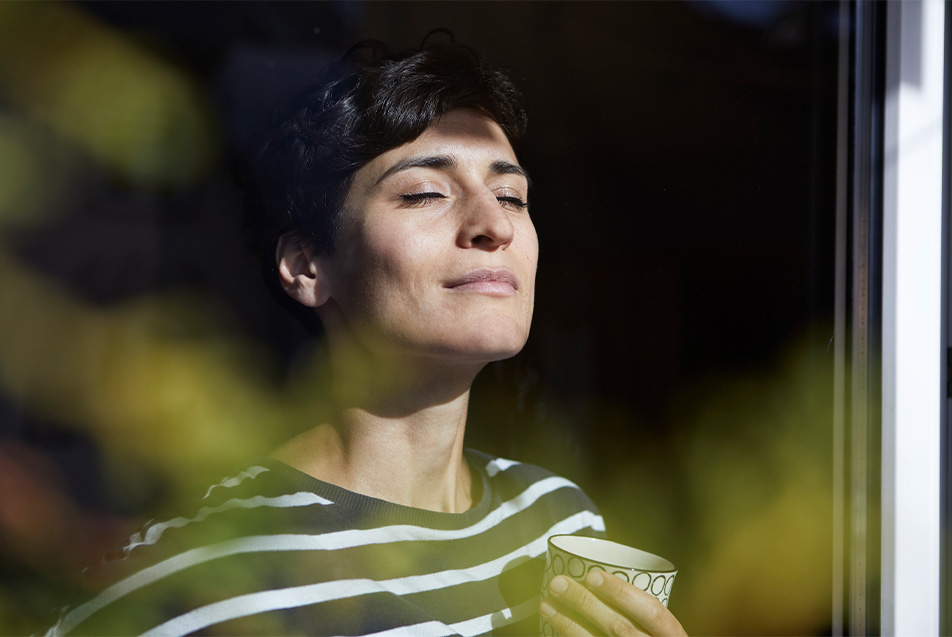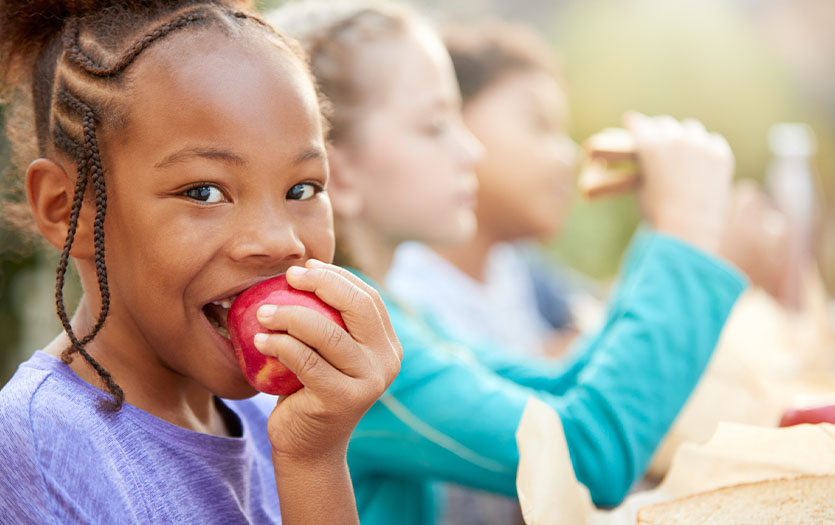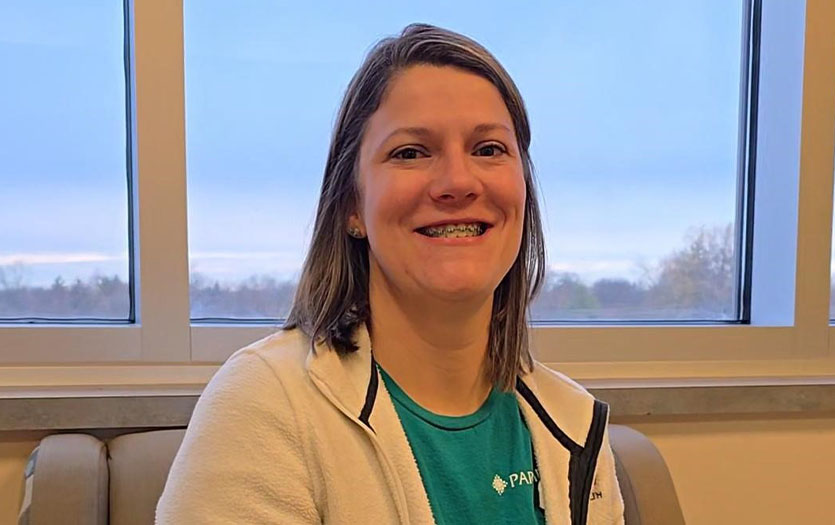
Enjoy this monthly mindfulness post from Dave Johnson, PhD, CNS-BC, LMFT, Employee Assistance Specialist.
Lost
Stand still. The trees ahead and bushes beside you
Are not lost. Wherever you are is called Here,
And you must treat it as a powerful stranger,
Must ask permission to know it and be known.
The forest breathes. Listen. It answers,
I have made this place around you.
If you leave it, you may come back again, saying Here.
No two trees are the same to Raven.
No two branches are the same to Wren.
If what a tree or a bush does is lost on you,
You are surely lost. Stand still. The forest knows
Where you are. You must let it find you.
- David Wagoner (1999)
My wife, Rosie, and I recently walked to Foster Park, located behind our home. The park was very peaceful. We listened to the birds, noticed early signs of spring, and marveled at the gently flowing Saint Mary’s river that edges the pathway of the Rivergreenway. Earlier in the day, our minds were filled with thoughts about social distancing and worry about the COVID-19 virus.
We have been consumed, like others, with media, community, work and healthcare responses, and concerns that are evolving at an unprecedented speed and certainly uncharted territory. My emotional response can and often does go to fear with uncertainty mode. But in the pause of the walk, we set intention to take ourselves offline and out of thinking mind to a space of presence and calm. We walked slowly, stopped multiple times to listen and breathe, and simply notice. We immersed ourselves in the abundance of beauty using our senses for sight, sound, fragrance, and feeling the essence of the path beneath our feet. We could have walked the path on autopilot while deep in conversation, but we attempted to sustain sensory awareness with our practice of mindfulness.
As I write now, I ponder about some benefits of the everyday practice of mindfulness for our response to fear during turbulent times.
- Be intentional. One needs to stay informed of the evolving storm by listening to the news, reading the newspaper and staying current with reputable medical and governmental sources. These inputs on what and how the world and healthcare systems are responding to the COVID-19 pandemic are needed. But our body keeps the score with the fight, flight and freeze response, and we have to avoid getting stuck in fear toxicity. We also need to give ourselves an intentional reprieve. Turning off the news and tuning into one’s awareness using the senses to stay present and calm in the storm is lifegiving and healing. Practicing a mindful body scan helps to let go of the buildup of the stress response.
- Name fears. As a nurse and therapist, I often help folks name the fear, pain or grief they are experiencing. Saying the words out loud … “I am scared, angry, confused, overwhelmed, etc.” doesn’t remove the strong emotion that one is experiencing, but acknowledges the reality and gives light and voice to where one is consumed. My colleague Dr. Jon Swanson, who is a hospital chaplain for Parkview, often looks into the eyes of despair and he utters the words, “This is hard.” He doesn’t placate or sugar coat or attempt to jelly the pain of others. He reminds me that authenticating my own emotional response is real, needed and perhaps one of the most compassionate realities one can do in fearful, turbulent times. This is hard! This is hard! Perhaps even today, this is damn hard!
- Invite hope. I see hope as the embodiment of spirit. Hope is the knowingness and wisdom that storms come and go and that goodness is a strong force within humanity. Hope finds voice and hands and eyes for those who invite it into their being. Perhaps our genes lean us in the direction of seeing a glass as half empty or full, but I am also certain that our thoughts and intentional focus open us to noticing goodness. Hope pairs well with self-compassion and healing and is needed for building resilience to the wears and tears of stress. Being loving, kind and tender to oneself and others invites hope within and between.
- Slow breathing. Having awareness of breathing shifts me from the “monkey”, ruminative mind of thinking to a place of rhythm and flow. This space of awareness is a great place to begin to notice patterns. Take 30 seconds to breathe slowly and deeply through your nose and exhale even a bit more slowly through pursed lips, as if you were blowing through a straw. Coming out of my stress-filled thinking brain and giving myself a few moments to slow and calm is good medicine for the body and soul.
- Savoring a moment. Savoring breakfast or a first cup of coffee as we begin our juggle of a world, job, family that is in flux, can be helpful. Bless your food, others you live with or perhaps most of all, yourself. The world can seem demanding, intense, ruthless and unforgiving. The spiritual practice of blessing shows up in all the world traditions. Draw from the deep well of long traditions of stillness (even amid chaos) to notice a pause, a savor, a well wish to the day. Notice others who use simple rituals that ease the mind and spirit as we launch into a new day.
- Family coping. Acknowledge COVID-19 has turned our world and family upside down and seeking additional resources for our loved ones can help. My Parkview Health colleague Brandon T. McDaniel, PhD, research scientist, recently put together a wonderful family friendly list of resources and tips to help families cope with stress. Reviewing and using these ideas can help the family keep a sense of balance during uncertainty.
- Nature heals. Earlier in the year I had already begun to think about writing about mindfulness and nature, but perhaps it is now needed more than ever, as we look for antidotes to our fear responses. I have long time believed that Nature Deficit Disorder is real. Elderly folks often recall stories of spending dawn to dusk outside during the spring and summer seasons. By the end of the day, their bodies were caked in grime and sweat, their nailbeds filled with earth. Children and adults noticed the shapes and movement of clouds, collected bugs, wondered about the moonlight and delighted in stars that danced the night away.
In a day where we need to disinfect our hands and surfaces, and maintain social distance with the looming pandemic, perhaps reminding ourselves of the simple life-giving forces of nature’s trees, birds, flowers, sunlight, breeze and earth is also needed. Opening a window, listening to natural environmental sounds, looking at a picture of a beautiful landscape, cultivating indoor plants, or finding a favorite nature channel may be just what the body and soul need to quicken healing within and between.
Other resources
For a free 1:1 consultation with Dr. Dave or to find out about more on Mindfulness & Stress Management programs, contact the Parkview Center for Healthy Living at 260-672-6500. Dr. Dave also provides on-site guidance for teambuilding and transformational leadership, among other topics. To learn more about Employee Assistance Programs for your company, call Business Development at 260-373-9013. Mindfulness-based stress reduction (MBSR) practice has been extensively researched and proven helpful for coping with stress and change, grief, healthy eating patterns, pain, anxiety, depression and many other chronic disease and autoimmune disorders.
Follow, Integrate Mindfulness on Facebook, for posting of mindfulness and healing exercises from Dr. Dave.



